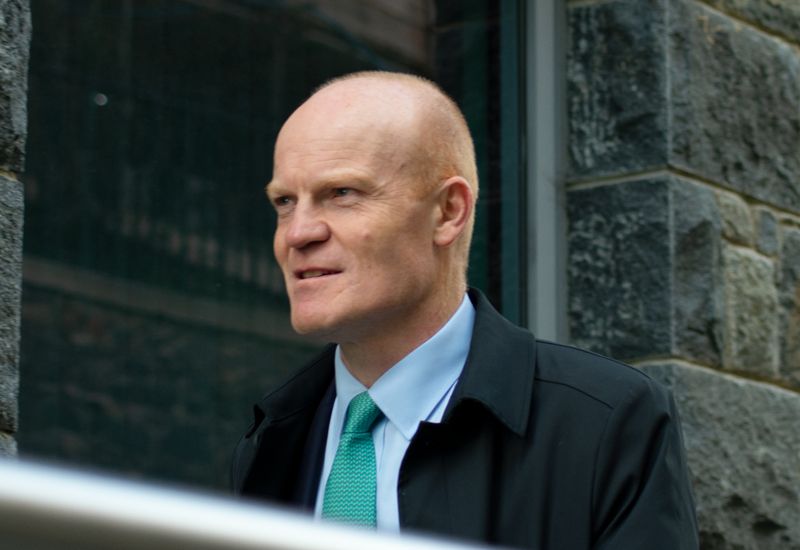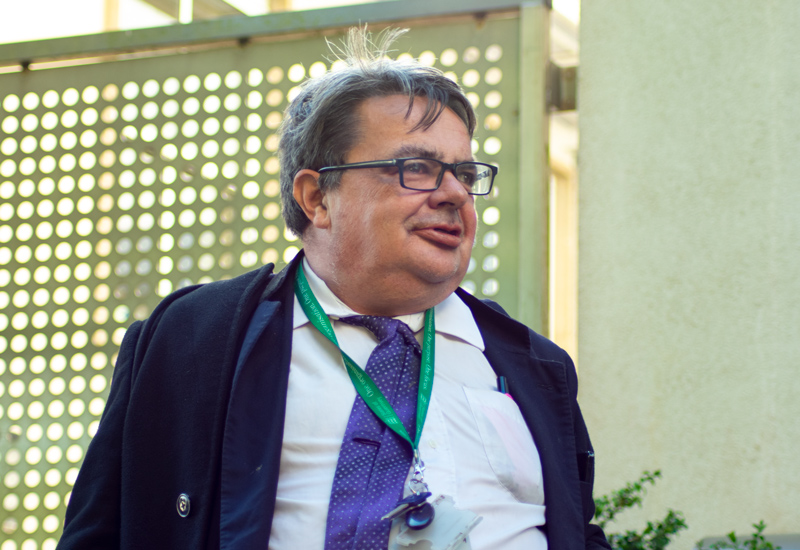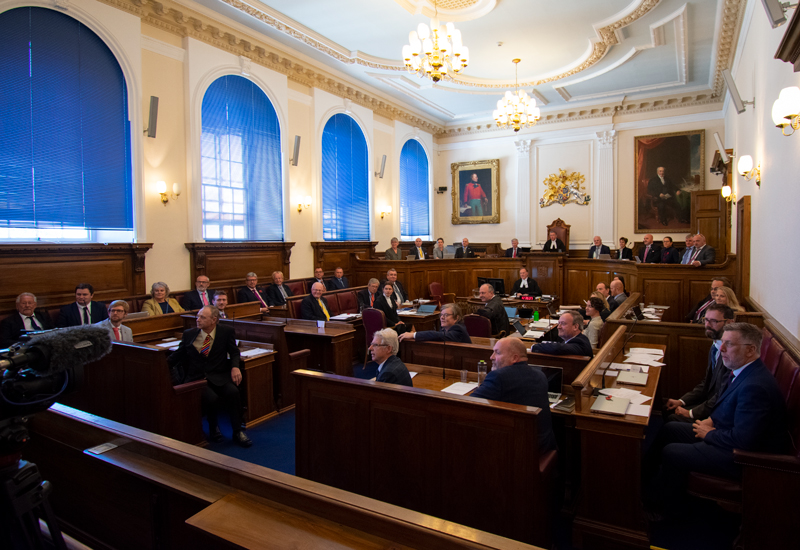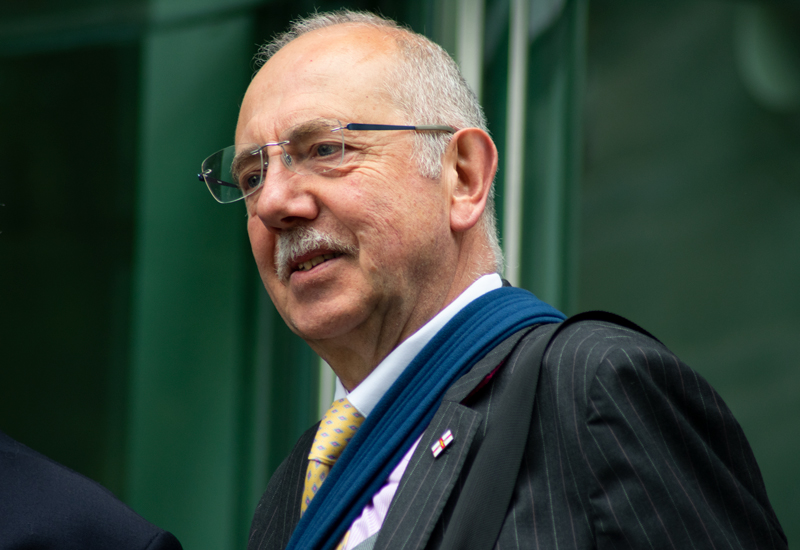


A deputy who named a local doctor under parliamentary privilege in the States Chamber has been cleared of wrongdoing after a protracted investigation into his actions.
Deputy Gavin St Pier made the comments during a States meeting in April 2022 where he attempted to get other politicians to support a motion to debate an annual document detailing the regulation of doctors, known as the Responsible Officer report, based on personally held concerns with the safeguarding of children.
10 members voted to debate the report, while 28 voted against.
An investigation was later requested by Health & Social Care following complaints from the local medical profession in June 2022 on the basis that Deputy St Pier had “unnecessarily named an individual doctor in debate, and that this was a misuse of privilege which warranted investigation”.
Health President Deputy Al Brouard submitted that the comments were unfair, had “called into question fitness to practise of the medical practitioner, when an independent investigation by an Authorised Person found there were no substantive concerns to uphold” causing them distress, and “caused concern among the medical profession about the implications of these events on the ability to recruit and retain staff”.
But a panel of five of the islands longest serving deputies dismissed the allegation by a majority of 3-2, with the findings published late yesterday.
Deputies John Gollop, Lyndon Trott, and Peter Roffey disagreed with Deputies Peter Ferbrache, the current Policy & Resources President, and David de Lisle that there had been an abuse of privilege in this case.
Deputy Ferbrache also penned a 31-page explanation for why the pair had disagreed with the conclusions of others on the privileges panel.
The full report can be found HERE.

Pictured: Deputy John Gollop, the longest serving member of the States, chaired the investigating panel.
The majority opinion was as follows: “We concluded that a member who is genuinely pursuing what they regarded as being the public interest cannot be said to behaving with malice or irresponsibly.
“Deputy St Pier clearly genuinely believed that his actions were in the public interest.
“We may not have acted in the way he did but it must be possible for parliamentarians to cause upset and distress in pursuit of what they regard as the wider public interest.
“There is a real danger that if we do not set the bar for what constitutes ‘abuse’ very high indeed then the yardstick for whether those accused of such should suffer, potentially very serious, consequences will become whether or not we agree with their actions. That would be a disaster.”
Responding to the findings, Deputy St Pier said he was “pleased and relieved” to not have been sanctioned.
“I am not surprised as in my view the naming of the individual would not be regarded as an abuse of privilege by any parliament in the Commonwealth.
“The whole process has been deeply frustrating,” he added, criticising the length of the investigation and “repeated leaks” to the media.
He indicated that he would continue to fight for improvements to medical safeguarding, claiming that improvements which have been recommended to Health are “progressing only slowly”.

Pictured: Politicians have exceptional freedom to speak inside parliament without fear of reprimand or litigation in order to raise matters they feel are in the public interest.
Deputy St Pier stood up in the States on 27 April 2022 and tried to convince colleagues to debate the Responsible Officer annual report – which is usually laid in the order paper to be noted by politicians, but not debated.
He used a personal example in which a complaint his family had filed against the Medical Specialist Group had “triggered a bizarre and Kafkaesque safeguarding investigation, which our GP described at the time as the ‘weaponisation’ of the safeguarding service”.
Debating the report was “one of the very few tools that we have in our local health regulatory toolbox that the community has to ensure that clinical care and the governance and the culture of our healthcare system is as it should be”.
He argued that “there have been egregious failings in our safeguarding culture and processes and their weaponisation has not only wasted precious and limited resources, it has also prevented children and families from being kept safe”.
Deputy Brouard attempted to stop Deputy St Pier from speaking on two occasions in the States, including immediately after the doctor was named.
The Bailiff allowed Deputy St Pier to continue as there had been no breach of parliamentary rules, saying: “It is not a point of order, with great respect to you, Deputy Brouard, for somebody to use the privilege that is available to them in this Assembly.
“Whether or not there is an issue about abuse of privilege is another matter, but that is not a breach of the rules and the abuse of privilege under the Code of Conduct is something that will have to be borne in mind.
“It is not hugely desirable, within the context of this Assembly, for any member to take advantage of the privilege that is there, but it is something that is conferred by primary legislation and therefore we are all subject to.”
Responding to Deputy St Pier, Deputy Brouard said the matters Deputy St Pier wished to have debated were not a feature of the “narrow” report before States members.

Pictured: HSC President Deputy Al Brouard.
“The recommendations that Deputy St Pier refers to are included in a report addressed to Health & Social Care and relate to services as a whole. They are not recommendations in relation to an individual doctor. This report is not mentioned in the Responsible Officer’s Report because it is a matter which does not relate to the discharge of the regulatory functions, so it is not relevant,” he said.
“The Responsible Officer’s Report, which is the one in front of you, provides no further information relating to the nature of concerns for very good reason. To do so could inadvertently breach the confidentiality of those service users and practitioners involved, thus seriously undermining and damaging public confidence in the medical practice of that doctor and that of services provided by primary care, Health & Social Care and/or the Medical Specialist Group.
“It is a factual, high-level Report, which sets out amongst other things the high level of revalidation standards achieved locally; 98.6% of local practitioners completed appraisals during 2021, which compares favourably with the most recent published UK rates of 91.5%.
“I know that Deputy St Pier has been involved with these very difficult, complex and challenging issues, not only for the families, who I can fully understand their frustration and pain, but also for the clinicians and our Committee. However, it is still not appropriate that these issues, however well meaning, are played out on the floor of this Assembly.”
States throw out Deputy's request to debate annual report on doctors
HSC reassures as Deputy says States can't "magic away the problems"
Comments
Comments on this story express the views of the commentator only, not Bailiwick Publishing. We are unable to guarantee the accuracy of any of those comments.